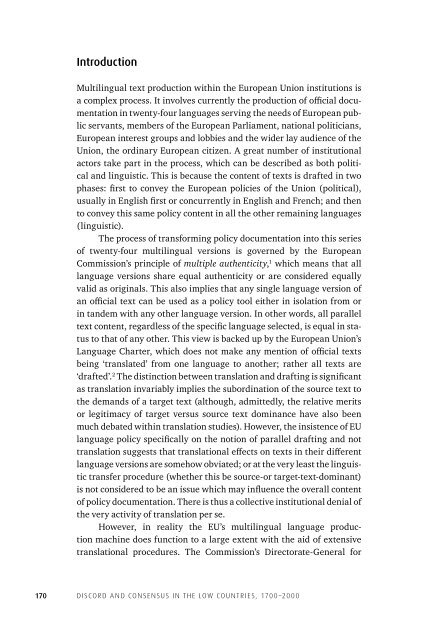Discord Consensus
7aze300jFJo
7aze300jFJo
Create successful ePaper yourself
Turn your PDF publications into a flip-book with our unique Google optimized e-Paper software.
Introduction<br />
Multilingual text production within the European Union institutions is<br />
a complex process. It involves currently the production of official documentation<br />
in twenty-four languages serving the needs of European public<br />
servants, members of the European Parliament, national politicians,<br />
European interest groups and lobbies and the wider lay audience of the<br />
Union, the ordinary European citizen. A great number of institutional<br />
actors take part in the process, which can be described as both political<br />
and linguistic. This is because the content of texts is drafted in two<br />
phases: first to convey the European policies of the Union (political),<br />
usually in English first or concurrently in English and French; and then<br />
to convey this same policy content in all the other remaining languages<br />
(linguistic).<br />
The process of transforming policy documentation into this series<br />
of twenty-four multilingual versions is governed by the European<br />
Commission’s principle of multiple authenticity, 1 which means that all<br />
language versions share equal authenticity or are considered equally<br />
valid as originals. This also implies that any single language version of<br />
an official text can be used as a policy tool either in isolation from or<br />
in tandem with any other language version. In other words, all parallel<br />
text content, regardless of the specific language selected, is equal in status<br />
to that of any other. This view is backed up by the European Union’s<br />
Language Charter, which does not make any mention of official texts<br />
being ‘translated’ from one language to another; rather all texts are<br />
‘drafted’. 2 The distinction between translation and drafting is significant<br />
as translation invariably implies the subordination of the source text to<br />
the demands of a target text (although, admittedly, the relative merits<br />
or legitimacy of target versus source text dominance have also been<br />
much debated within translation studies). However, the insistence of EU<br />
language policy specifically on the notion of parallel drafting and not<br />
translation suggests that translational effects on texts in their different<br />
language versions are somehow obviated; or at the very least the linguistic<br />
transfer procedure (whether this be source-or target-text-dominant)<br />
is not considered to be an issue which may influence the overall content<br />
of policy documentation. There is thus a collective institutional denial of<br />
the very activity of translation per se.<br />
However, in reality the EU’s multilingual language production<br />
machine does function to a large extent with the aid of extensive<br />
translational procedures. The Commission’s Directorate-General for<br />
170<br />
DISCORD AND CONSENSUS IN THE LOW COUNTRIES, 1700–2000


